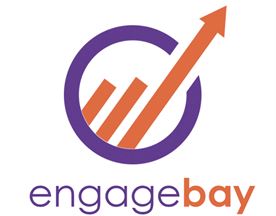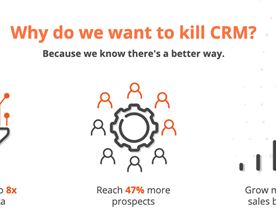Boost business with CRM by enhancing customer engagement, personalizing experiences, automating marketing, improving data analysis, and streamlining sales processes. Effective examples of CRM strategies lead to better customer understanding, increased efficiency, and higher sales.
Customer relationship management (CRM) is a strategy that businesses use to manage interactions with customers and potential customers. It involves using technology to organize, automate, and synchronize sales, marketing, customer service, and technical support processes. CRM is a critical component of modern business operations, as it enables businesses to build strong relationships with customers and improve their overall experience.
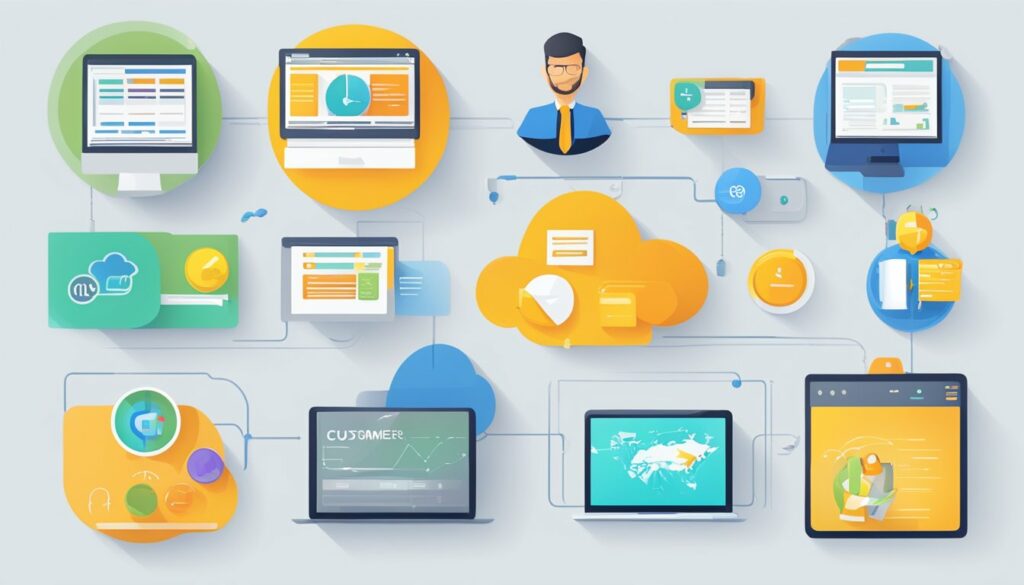
There are many examples of CRM software available on the market, each with its own set of features and capabilities. Some popular CRM software options include Salesforce, HubSpot, Zoho, and Microsoft Dynamics 365. These platforms offer a wide range of tools and functionalities that businesses can use to manage customer data, automate workflows, and improve customer engagement. CRM software can be used by businesses of all sizes and across all industries, making it a versatile and valuable tool for any organization looking to improve its customer relationships.
Key Takeaways
- CRM is a strategy that businesses use to manage interactions with customers and potential customers.
- There are many examples of CRM software available on the market, each with its own set of features and capabilities.
- CRM software can be used by businesses of all sizes and across all industries, making it a versatile and valuable tool for any organization looking to improve its customer relationships.
Understanding CRM
Customer Relationship Management (CRM) is a strategy that businesses use to manage interactions with customers and potential customers. CRM allows organizations to streamline their sales, marketing, and customer service processes by providing a centralized platform for managing customer data. This section will explore the core functions of CRM and the benefits it provides to businesses.
Core Functions of CRM
The core functions of CRM include sales management, marketing automation, and customer service management.
Sales management involves managing the sales process, from lead generation to closing the deal. CRM systems provide tools for tracking leads, managing sales pipelines, and forecasting sales. Sales teams can use CRM to prioritize leads, automate follow-up tasks, and collaborate with other team members.
Marketing automation involves automating marketing tasks such as email campaigns, social media, and advertising. CRM systems provide tools for segmenting customers, creating targeted marketing campaigns, and tracking campaign performance. Marketing teams can use CRM to personalize marketing messages, nurture leads, and improve customer engagement.
Customer service management involves managing customer interactions, from support requests to complaints. CRM systems provide tools for tracking customer issues, managing support tickets, and resolving customer problems. Customer service teams can use CRM to improve response times, personalize interactions, and track customer satisfaction.
Benefits of CRM for Businesses
CRM provides numerous benefits to businesses, including improved communication, collaboration, and customer experience.
CRM enables businesses to communicate more effectively with customers by providing a centralized platform for managing customer interactions. With CRM, businesses can track customer interactions across multiple channels, including email, phone, and social media. This enables businesses to respond to customer inquiries quickly and efficiently.
CRM also enables businesses to collaborate more effectively by providing tools for sharing customer data and insights. With CRM, sales, marketing, and customer service teams can work together to provide a seamless customer experience. This enables businesses to identify cross-selling and upselling opportunities, improve customer retention, and increase revenue.
Finally, CRM provides businesses with tools for improving the customer experience. With CRM, businesses can track customer interactions, preferences, and behaviors. This enables businesses to provide personalized experiences that meet the unique needs of each customer.
In conclusion, CRM is a powerful strategy that businesses can use to improve their sales, marketing, and customer service processes. By providing a centralized platform for managing customer data, CRM enables businesses to communicate more effectively, collaborate more efficiently, and provide personalized experiences that meet the unique needs of each customer.
Here is a link to a high authority resource that provides more information on CRM.
CRM Software Overview
Customer Relationship Management (CRM) software is an essential tool for businesses to manage their interactions with customers and prospects. It helps companies to streamline their sales processes, improve customer service, and increase customer satisfaction. In this section, we will provide an overview of popular CRM software and tips for choosing the right one.
Popular CRM Software
Salesforce is a cloud-based CRM solution that is widely used by businesses of all sizes. It offers a range of features, including sales automation, marketing automation, customer service, and analytics. Salesforce is known for its scalability and flexibility, making it a popular choice for businesses that want to customize their CRM to meet their specific needs.
HubSpot is another popular CRM software that offers a range of tools for marketing, sales, and customer service. It is a cloud-based solution that is easy to use and offers a free version for small businesses. HubSpot is known for its user-friendly interface and powerful marketing automation features.
Pipedrive is a CRM software that is designed specifically for sales teams. It offers a visual sales pipeline that helps salespeople to manage their deals more effectively. Pipedrive is known for its simplicity and ease of use, making it a popular choice for small businesses.
Zoho is a cloud-based CRM solution that offers a range of features, including sales automation, marketing automation, and customer service. It is known for its affordability and flexibility, making it a popular choice for small and mid-sized businesses.
Microsoft Dynamics is a CRM software that is designed for enterprise-level businesses. It offers a range of features, including sales automation, marketing automation, and customer service. Microsoft Dynamics is known for its integration with other Microsoft products, making it a popular choice for businesses that use Microsoft software.
Choosing the Right CRM Software
When choosing a CRM software, it is important to consider factors such as the size of your business, your budget, and the features you need. It is also important to consider factors such as ease of use, scalability, and integration with other software.
One important factor to consider is whether you want a cloud-based or on-premise solution. Cloud-based solutions are typically more affordable and easier to use, while on-premise solutions offer more control and customization.
Another important factor to consider is the level of support and training that is offered by the CRM software provider. Look for a provider that offers comprehensive training and support to ensure that your team can use the software effectively.
Overall, there are many CRM software options available, each with their own strengths and weaknesses. By considering your business needs and doing your research, you can choose the right CRM software to help your business grow and succeed.
Here is a helpful resource for more information on choosing the right CRM software.
CRM Implementation
Implementing a CRM system can be a complex process, but it is essential for any business that wants to improve its customer relationships. There are several key steps involved in successfully implementing a CRM system, including setting up the system, customizing and integrating it with other tools, and ensuring user adoption and training.
Setting up a CRM System
The first step in implementing a CRM system is to set it up properly. This involves selecting the right CRM software for your business, configuring it to meet your needs, and ensuring that it is integrated with other tools and systems that you use. Some popular CRM systems include Salesforce, HubSpot, and Zoho.
When setting up a CRM system, it is important to consider your workflows and processes. Your CRM system should be designed to support your existing workflows and make it easier to manage customer relationships. This may involve setting up custom fields, creating custom reports, or configuring workflows to automate certain tasks.
Customization and Integration
Once your CRM system is set up, the next step is to customize and integrate it with other tools and systems. This may involve integrating your CRM system with your ERP or project management software, or setting up email integration to ensure that all customer communications are captured in your CRM system.
Customization is also important to ensure that your CRM system meets your specific needs. This may involve customizing fields, creating new reports, or setting up workflows to automate certain tasks. The goal of customization is to ensure that your CRM system is tailored to your business and helps you manage customer relationships more effectively.
User Adoption and Training
The final step in implementing a CRM system is to ensure that your team is properly trained and adopts the new system. This may involve providing training sessions, creating user guides, or setting up a help desk to provide ongoing support.
User adoption is critical to the success of your CRM system. If your team does not use the system, it will not be effective in improving your customer relationships. To encourage adoption, it is important to provide ongoing training and support, as well as to ensure that the system is easy to use and provides value to your team.
Overall, implementing a CRM system requires careful planning, customization, and user adoption. By following these steps and ensuring that your CRM system is integrated with other tools and systems, you can improve your customer relationships and grow your business.
Here is a helpful resource for learning more about CRM implementation and best practices.
CRM for Sales and Marketing

CRM in the Sales Process
CRM software can greatly enhance the sales process by providing sales teams with a comprehensive view of their prospects and customers. By tracking customer interactions, sales reps can better understand the needs of their customers and tailor their approach accordingly. CRM also enables sales reps to automate many of their routine tasks, such as data entry and lead qualification, freeing up more time for selling.
One of the key benefits of using CRM in the sales process is the ability to track sales performance through analytics. With CRM analytics, sales managers can gain insights into their team’s performance, identify areas for improvement, and make data-driven decisions to improve sales outcomes.
Marketing Automation with CRM
Marketing automation is another key feature of CRM that can help businesses streamline their marketing efforts. With CRM, businesses can automate many of their marketing tasks, such as lead nurturing, email marketing, and social media management. By automating these tasks, businesses can save time and resources while still maintaining a high level of engagement with their prospects and customers.
One of the key benefits of using CRM for marketing automation is the ability to create targeted campaigns based on customer data. With CRM, businesses can segment their customer database based on various criteria, such as demographics, interests, and behavior. This enables them to create personalized campaigns that are more likely to resonate with their target audience.
Overall, CRM software is a powerful tool for sales and marketing teams looking to improve their customer relationships and streamline their processes. By leveraging the features of CRM, businesses can gain a competitive edge in today’s fast-paced business environment.
Here is a high-authority resource for more information on CRM and its benefits for sales and marketing.
CRM for Customer Service and Support

Customer service and support are critical components of any business. A good CRM system can help improve customer support and satisfaction, leading to increased loyalty and productivity. In this section, we will discuss how CRM can be used to improve customer service and support, as well as manage customer feedback.
Improving Customer Support
A CRM system can help businesses provide better customer support by centralizing customer information, including purchase history, preferences, and contact information. This allows customer service representatives to quickly access the information they need to provide personalized support. Additionally, a CRM system can automate routine tasks, such as sending confirmation emails or tracking customer interactions, freeing up time for customer service representatives to focus on more complex issues.
One popular CRM system for customer support is Zendesk. Zendesk offers a help desk software that allows businesses to manage customer support tickets, track customer interactions, and provide self-service support options. With Zendesk, businesses can improve response times and provide a better overall customer experience.
Managing Customer Feedback
A CRM system can also help businesses manage customer feedback, allowing them to identify areas for improvement and make changes to improve customer satisfaction. By tracking customer feedback and sentiment, businesses can identify trends and address issues before they become major problems. Additionally, a CRM system can help businesses track customer loyalty and identify customers who may be at risk of leaving.
One way to manage customer feedback is through the use of surveys. SurveyMonkey is a popular survey tool that can be integrated with a CRM system to collect customer feedback. With SurveyMonkey, businesses can create customized surveys, track responses, and analyze results to gain insights into customer satisfaction and loyalty.
In conclusion, a CRM system can be a valuable tool for improving customer service and support. By centralizing customer information and automating routine tasks, businesses can provide better support and free up time for customer service representatives to focus on more complex issues. Additionally, by managing customer feedback, businesses can identify areas for improvement and make changes to improve customer satisfaction and loyalty.
CRM Data Management and Analysis

Effective CRM data management and analysis are crucial for businesses to make informed decisions and improve customer satisfaction. This section will explore two essential aspects of CRM data management and analysis: tracking customer interactions and CRM reporting and dashboards.
Tracking Customer Interactions
Tracking customer interactions is a vital part of CRM data management. It involves keeping a record of all customer interactions, including phone calls, emails, and social media interactions. This data helps businesses understand their customers’ needs and preferences and tailor their services accordingly.
CRM software allows businesses to automate the tracking of customer interactions, making it easier to manage customer data. For instance, Salesforce, a leading CRM software, allows businesses to track customer interactions across multiple channels, including social media, email, and phone calls. This feature helps businesses monitor customer behavior and identify patterns that can inform marketing strategies.
CRM Reporting and Dashboards
CRM reporting and dashboards provide businesses with valuable insights into their customer base. These tools help businesses analyze customer data and make informed decisions. CRM reporting involves generating reports that show how customers interact with a business, while dashboards display this data in real-time.
Salesforce offers a range of reporting and dashboard features that businesses can use to analyze customer data. These features include lead management, contact management, forecasting, and sales forecasting. Salesforce also provides customizable dashboards that businesses can use to track customer behavior and monitor sales performance.
In conclusion, effective CRM data management and analysis are crucial for businesses to improve customer satisfaction and make informed decisions. By tracking customer interactions and using CRM reporting and dashboards, businesses can gain valuable insights into their customer base and tailor their services accordingly. For more information on CRM data management and analysis, check out this link.
CRM Strategies and Best Practices

Building Customer Relationships
Building customer relationships is a crucial aspect of any CRM strategy. A successful CRM strategy focuses on establishing and maintaining long-term relationships with customers. It involves understanding the customer’s needs, preferences, and behaviors. By doing so, businesses can personalize their interactions with customers and provide them with a seamless experience.
One of the best practices for building customer relationships is to leverage CRM tools. CRM tools help businesses manage customer interactions, track customer behavior, and analyze customer data to gain insights. By doing so, businesses can identify opportunities to improve their customer experience and build stronger relationships with customers.
Another best practice is to set clear goals and objectives. Businesses should identify what they want to achieve with their CRM strategy and align their efforts accordingly. For example, if the goal is to increase customer retention, businesses can focus on developing retention campaigns and loyalty programs.
CRM for Customer Retention
Customer retention is another critical aspect of any CRM strategy. It involves keeping customers engaged and satisfied with the business’s products or services. A successful customer retention strategy involves understanding the customer’s needs and preferences and providing them with personalized experiences.
One of the best practices for customer retention is to focus on pipeline management. Pipeline management involves managing the sales process from lead generation to conversion. By doing so, businesses can identify opportunities to upsell and cross-sell to existing customers, thereby increasing customer retention.
Another best practice is to leverage CRM tools to track customer behavior and analyze customer data. By doing so, businesses can identify patterns and trends in customer behavior and gain insights into what drives customer loyalty. This information can then be used to develop retention campaigns and loyalty programs.
In conclusion, CRM strategies and best practices are essential for building and maintaining long-term customer relationships. By leveraging CRM tools, setting clear goals and objectives, and focusing on pipeline management and customer retention, businesses can improve their customer experience and build stronger relationships with customers.
Here is a link to an external resource that provides more information on CRM strategies and best practices.
Advanced CRM Features
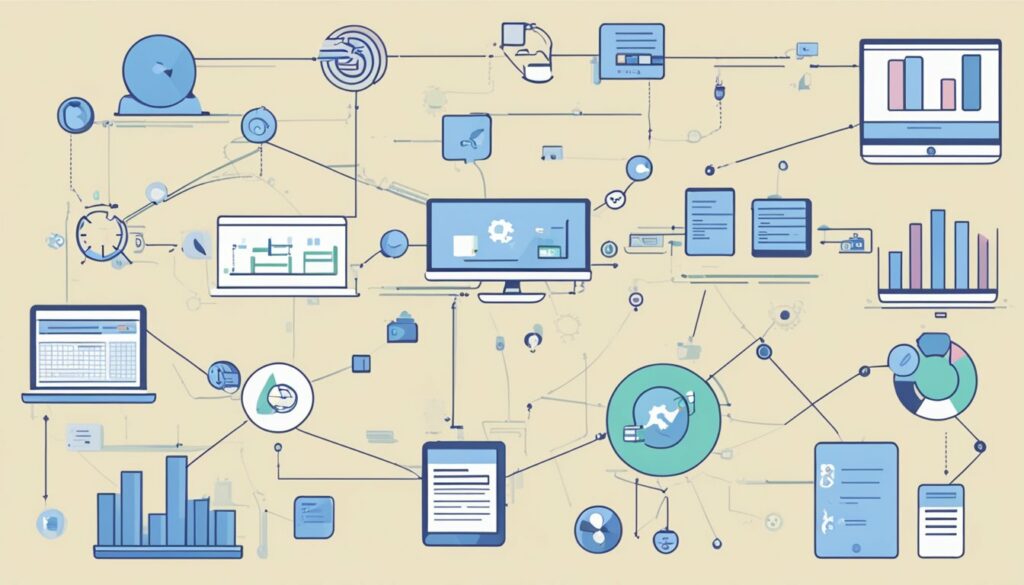
Artificial Intelligence in CRM
Artificial Intelligence (AI) is transforming the way businesses approach customer relationship management. By leveraging AI-powered tools, businesses can gain valuable insights into their customers’ behaviors, preferences, and needs. AI-powered CRM solutions can analyze customer data in real-time, allowing businesses to personalize their marketing efforts and improve customer engagement.
One example of AI in CRM is predictive analytics. Predictive analytics tools use machine learning algorithms to analyze customer data and predict future behavior. This can help businesses identify customers who are at risk of churning and take proactive steps to retain them.
Another example is chatbots. Chatbots use natural language processing (NLP) to communicate with customers and provide them with personalized support. This can help businesses improve customer satisfaction and reduce the workload of their customer service teams.
Mobile CRM Solutions
Mobile CRM solutions allow businesses to manage their customer relationships on-the-go. With a mobile app, sales reps can access customer data, manage leads and contacts, and track their progress from anywhere. This can help businesses improve their sales productivity and stay connected with their customers.
One example of a mobile CRM solution is BigContacts. BigContacts offers a mobile app that allows users to manage their contacts, tasks, and calendar on-the-go. The app also includes features like lead and contact management, email marketing, and project management.
Another example is Salesforce Mobile. Salesforce Mobile offers a mobile app that allows users to access their Salesforce data from anywhere. The app includes features like lead and contact management, opportunity management, and real-time analytics.
Overall, advanced CRM features like AI and mobile solutions can help businesses improve their customer relationships and drive growth. By leveraging these tools, businesses can gain valuable insights into their customers’ needs and behaviors, and take proactive steps to meet those needs.
CRM for Different Business Sizes

When it comes to CRM, businesses of all sizes can benefit from the software’s ability to manage customer interactions and improve customer relationships. However, the needs of small businesses and large enterprises can vary greatly. In this section, we will explore how CRM can benefit businesses of different sizes.
CRM for Small Businesses
Small businesses often have limited resources and need an affordable CRM solution that can help them manage sales and customer interactions. Operational CRM is a good fit for small businesses as it focuses on automating sales and marketing processes. This helps small businesses save time and resources while still maintaining customer relationships.
One affordable CRM solution for small businesses is Zoho CRM. It offers a free plan for up to three users and has features such as lead management, contact management, and sales forecasting. Zoho CRM also integrates with other Zoho products such as Zoho Books and Zoho Desk, making it a great all-in-one solution for small businesses.
CRM for Mid-Sized and Large Enterprises
Mid-sized and large enterprises have more complex needs when it comes to CRM. They require a solution that can handle large amounts of data and provide insights to improve customer interactions. Analytical CRM is a good fit for mid-sized and large enterprises as it focuses on data analysis and provides insights into customer behavior.
One CRM solution for mid-sized and large enterprises is Salesforce. It offers a range of features such as lead management, contact management, and marketing automation. Salesforce also has a collaborative CRM feature that allows teams to work together on customer interactions. Additionally, Salesforce offers a range of integrations with other software, making it a flexible solution for mid-sized and large enterprises.
Overall, CRM can benefit businesses of all sizes. Small businesses can benefit from an affordable solution that focuses on automating sales and marketing processes, while mid-sized and large enterprises can benefit from a solution that provides insights into customer behavior and allows teams to collaborate on customer interactions.
To learn more about CRM for different business sizes, check out this article by Business News Daily.
CRM Integration and Expansion
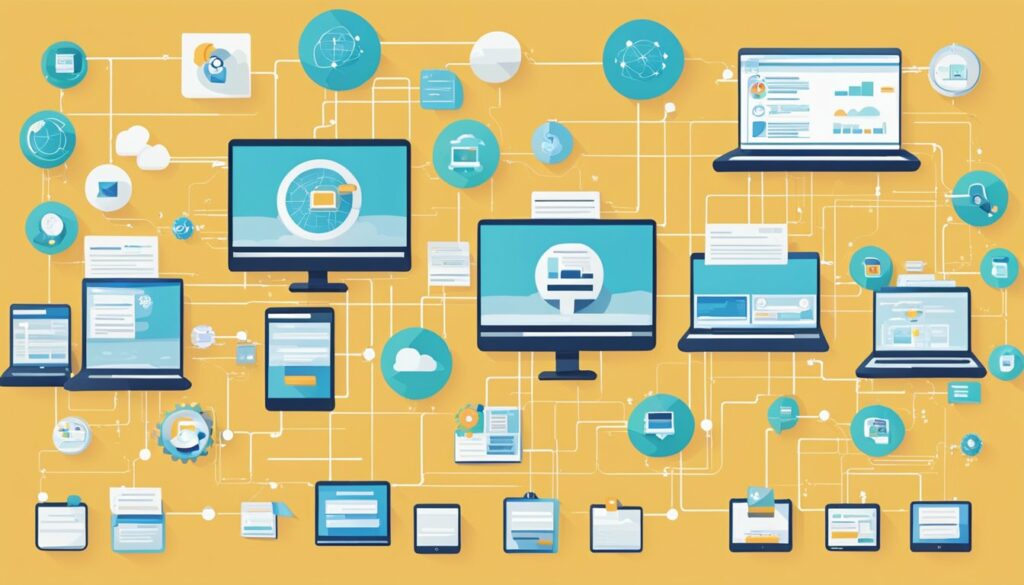
Expanding and integrating CRM with other business systems is essential for businesses to grow and thrive. This section will explore some of the ways CRM can be expanded and integrated with other systems.
Expanding CRM with Add-Ons
One way to expand CRM is by using add-ons. These add-ons can be used to enhance the functionality of the CRM system, making it more useful and efficient. For example, LinkedIn integration can be used to import contacts and leads directly into the CRM system, making it easier to manage and track them. Similarly, ActiveCampaign integration can be used to automate email marketing campaigns and track their performance.
Another way to expand CRM is by using project management tools. These tools can be used to manage projects and tasks, assign them to team members, and track their progress. This can be especially useful for businesses that have multiple projects and tasks to manage.
Integrating CRM with Other Business Systems
Integrating CRM with other business systems is another way to enhance its functionality. For example, integrating CRM with operational systems can help businesses streamline their processes and improve efficiency. This can be done by integrating CRM with opportunity management systems, which can help businesses track sales opportunities and manage them more effectively.
Customization is another important aspect of CRM integration. Businesses can customize their CRM systems to meet their specific needs and requirements. This can be done by integrating CRM with CMS systems, which can help businesses create and manage their website content more effectively.
Trust is also an important factor when it comes to CRM integration. Businesses need to ensure that their CRM system is secure and reliable. EngageBay, for example, is a CRM system that offers high levels of security and reliability, making it a popular choice for businesses.
Marketing Hub and Service Hub are other examples of business systems that can be integrated with CRM. Marketing Hub can be used to manage marketing campaigns, while Service Hub can be used to manage customer service interactions.
In conclusion, expanding and integrating CRM with other business systems is essential for businesses to grow and succeed. By using add-ons and integrating with other systems, businesses can enhance the functionality of their CRM system, improve efficiency, and better manage their operations.
CRM Trends and Future Outlook

Emerging Technologies in CRM
As the world becomes more digital, new technologies are emerging that are transforming the way businesses interact with their customers. One such technology is artificial intelligence (AI), which is being used to automate many of the repetitive tasks involved in customer relationship management (CRM). AI-powered chatbots, for example, can handle routine customer inquiries, freeing up human agents to focus on more complex issues.
Another emerging technology is the Internet of Things (IoT), which is enabling businesses to collect vast amounts of data about their customers’ behavior and preferences. This data can be used to personalize the customer experience and deliver more targeted marketing campaigns.
The Future of CRM
Looking ahead, the future of CRM is likely to be shaped by a number of key trends. One such trend is the increasing importance of mobile devices. With more and more people accessing the internet via their smartphones and tablets, businesses need to ensure that their CRM systems are optimized for mobile devices.
Another trend is the growing use of social media as a customer service channel. Customers are increasingly turning to social media to voice their complaints and seek help, and businesses need to be able to respond quickly and effectively if they want to maintain a positive reputation.
Finally, there is the trend towards greater personalization. Customers today expect businesses to know their preferences and anticipate their needs, and CRM systems need to be able to deliver this level of personalized service if businesses want to remain competitive.
To stay ahead of these trends, businesses need to keep a close eye on the latest developments in the world of CRM. By embracing new technologies and adapting to changing customer expectations, they can build stronger, more profitable relationships with their customers.
Here is a comprehensive report on CRM trends that businesses can refer to for more information.
Frequently Asked Questions

What are the top features to look for in a CRM system?
When selecting a CRM system, there are several key features to consider. These include contact management, sales automation, marketing automation, analytics and reporting, and mobile accessibility. A good CRM system should also be customizable and scalable to meet the specific needs of your business.
How do successful companies integrate CRM into their business strategies?
Successful companies integrate CRM into their business strategies by making it a central part of their customer engagement and retention efforts. This involves aligning their sales, marketing, and customer service teams around a shared set of customer data and insights. By doing so, they can more effectively identify and respond to customer needs, and develop more personalized and effective marketing campaigns.
Can you provide real-world examples of CRM impacting customer satisfaction?
Yes, there are many real-world examples of CRM impacting customer satisfaction. For instance, American Express used CRM to reduce customer churn by 50% and increase customer spending by 10%. Similarly, Salesforce helped T-Mobile reduce customer service response times by 60%, leading to a 90% reduction in customer complaints.
What are the differences between the three main types of CRM?
The three main types of CRM are operational CRM, analytical CRM, and collaborative CRM. Operational CRM is focused on automating and improving customer-facing processes such as sales, marketing, and customer service. Analytical CRM is focused on analyzing customer data to gain insights into customer behavior and preferences. Collaborative CRM is focused on improving communication and collaboration between different departments and teams within a company.
Which CRM software is most popular among businesses today?
According to recent surveys, the most popular CRM software among businesses today is Salesforce, followed by HubSpot, Zoho CRM, and Microsoft Dynamics 365. Each of these platforms offers a range of features and capabilities to meet the needs of different businesses.
How do CRM applications differ in the retail industry compared to other sectors?
CRM applications in the retail industry differ from those in other sectors in several ways. For instance, they often include features such as inventory management, point-of-sale integration, and loyalty program management. Additionally, they may be more focused on customer engagement and retention, as opposed to lead generation and sales. A good example of a CRM platform designed specifically for the retail industry is Lightspeed Retail.
For more information on selecting the right CRM system for your business, check out this resource.
Compare hundreds of CRM Software in our Software Marketplace





